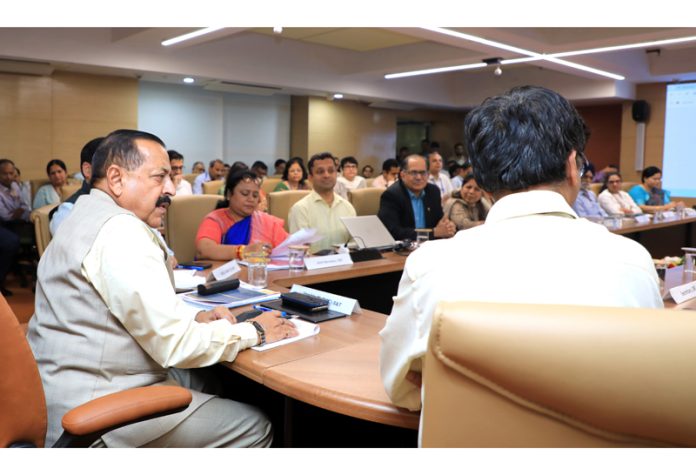
Excelsior Correspondent
NEW DELHI, Oct 23: Integration between Public and Private sectors is crucial to future growth, emphasized Dr. Jitendra Singh, Union Minister of State (Independent Charge) for Science and Technology, Minister of State (Independent Charge) for Earth Sciences, MoS PMO, Department of Atomic Energy, Department of Space, Personnel, Public Grievances and Pensions, in a pivotal session during the National Learning Week, jointly organized for all levels of employees of all the Science Ministries and Departments.
The Union Minister highlighted how the convergence of public sector requirements, private sector innovations, and Government efforts is shaping the next phase of technological advancement in the country. Referring to BharatGen, India’s indigenously developed large language model (LLM), and the growing role of AI in governance, Dr.Jitendra Singh stressed that such collaborative efforts are vital to drive innovation, improve public service delivery, and ensure India remains competitive in the global AI landscape.
The Minister noted that harnessing private sector expertise, combined with Government initiatives like BharatGen and AI applications, will pave the way for scalable, inclusive, and efficient solutions for the nation’s diverse needs.
Dr. Jitendra Singh further highlighted that the Government’s role in this integration is to create an enabling environment that fosters innovation, supports startups, and ensures that technological advancements align with national priorities. “When public demands meet private sector creativity, and Government policies facilitate growth, we can achieve scalable and sustainable solutions that benefit the entire country,” the Minister stated.
He praised the ongoing collaboration between the public sector and private enterprises in areas like AI and LLMs, which are vital for India’s competitive edge in the global tech landscape.
The session also saw participation from Secretary, Ministry of Science and Technology, Abhay Karandikar, Secretary Biotechnology Dr Rajesh Gokhale and Secretary, Ministry of Earth Sciences, Dr.M.Ravindran, who echoed Dr.Jitendra Singh’s views on the need for a united approach to ensure sustainable growth and innovation across sectors.
Experts highlighted how BharatGen can be applied to sectors such as governance, healthcare, and education, helping bridge linguistic gaps and making digital services accessible to a larger segment of India’s population. The model’s ability to understand and respond in regional languages ensures that AI technology is not limited to English speakers, providing a more personalized experience for users. BharatGen’s applications can range from AI-driven customer support for Government services to real-time translations and speech-to-text functionalities.
In a dedicated session on Artificial Intelligence (AI) during National Learning Week, employees from the Science Ministries were introduced to the transformative potential of AI in governance and public service delivery. The session highlighted how AI could be used to improve decision-making processes, streamline administrative tasks, and enhance citizen-centric services. By leveraging AI technologies, Government departments can increase efficiency, reduce human error, and create more responsive systems to meet the evolving needs of the public.
Concluding the session, Dr. Jitendra Singh reiterated the Government’s commitment to strengthening partnerships between the public and private sectors, emphasizing that such collaborations are not just beneficial but necessary for India’s long-term growth. He expressed confidence that with sustained efforts and a shared vision, India will continue to lead in technological advancements that are both inclusive and forward-looking.

